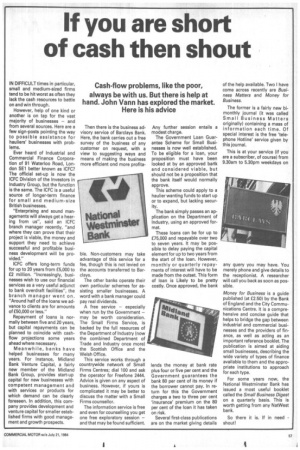If you are short of cash then shout
Page 59

If you've noticed an error in this article please click here to report it so we can fix it.
Cash-flow problems, like the poor, always be with us. But there is help at hand. John Vann has explored the market. Here is his advice
IN DIFFICULT times in particular, small and medium-sized firms tend to be hit worst as often they lack the cash resources to battle on and win through.
However, help of one kind or another is on tap for the vast majority of businesses — and from several sources. Here are a few sign-posts pointing the way to possible assistance for hauliers' businesses with problems.
Ever heard of Industrial and Commercial Finance Corporation of 91 Waterloo Road, London SE1 better known as ICFC? The official set-up is now the ICFC Division of the Investors in Industry Group, but the function is the same. The ICFC is a useful source of longer-term finance for small and medium-size British businesses.
"Enterprising and sound managements will always get a hearing from us", said an ICFC branch manager recently, "and where they can prove that their project is viable, the money and support they need to achieve successful and profitable business development will be provided."
ICFC offers long-term funds for up to 20 years from £5,000 to £2 million. "Increasingly, businesses wish to use our financial services as a very useful adjunct to bank overdraft facilities", the branch manager went on. "Around half of the loans we advance to clients are for amounts of £50,000 or less."
Repayment of loans is normally between five and 20 years, but capital repayments can be planned to coincide with cashflow projections some years ahead where necessary.
Meanwhile, banks have helped businesses for many years. For instance, Midland Bank Venture Capital, a fairly new member of the Midland Bank Group, provides start-up capital for new businesses with competent management and with services or products for which demand can be clearly foreseen. In addition, this company provides development and venture capital for smaller established firms with good management and growth prospects. Then there is the business advisory service of Barclays Bank. Here, the bank carries out a free survey of the business of any customer on request, with a view to suggesting ways and means of making the business more efficient ond more profita ble. Non-customers may take advantage of this service for a fee, though this is not levied on the accounts transferred to Barclays.
The other banks operate their own particular schemes for assisting smaller businesses. A word with a bank manager could pay real dividends.
A free service — especially when run by the Government — may be worth consideration. The Small Firms Service, is backed by the full resources of the Department of Industry (now the combined Department of Trade and Industry once more) the Scottish Office and the Welsh Office.
This service works through a countrywide network of Small Firms Centres; dial 100 and ask the operator for Freefone 2444. Advice is given on any aspect of business. However, if yours is complicated it may be better to discuss the matter with a Small Firms counsellor.
The information service is free and even for counselling you get one free exploratory session — and that may be found sufficient. Any further session entails a modest charge.
The Government Loan Guarantee Scheme for Small Businesses is now well established. To be eligible for a loan, your proposition must have been looked at by an approved bank and considered viable, but should not be a proposition that the bank itself would normally approve.
This scheme could apply to a haulier wanting funds to start up or to expand, but lacking security.
The bank simply passes an application on the Department of Industry, using an approved format.
These loans can be for up to £75,000 and repayable over two to seven years. It may be possible to delay paying the capital element for up to two years from the start of the loan. However, monthly or quarterly repayments of interest will have to be made from the outset. This form of loan is Likely to be pretty costly. Once approved, the bank lends the money at bank rate plus four or five per cent and the Government guarantees the bank 80 per cent of its money if the borrower cannot pay. In return for this the Government charges a two to three per cent 'insurance' premium on the 80 per cent of the loan it has taken on risk.
Several first-class publications are on the market giving details
of the help available. Two I have come across recently are Business Matters and Money for Business.
The former is a fairly new bimonthly journal (it was called Small Business Matters originally) containing a mass of information each time. Of special interest is the free 'telephone Hotline' service given by this journal.
This is at your service (if you are a subscriber, of course) from 9.30am to 5.30pm weekdays on any query you may have. You merely phone and give details to the receptionist. A researcher will call you back as soon as possible.
Money for Business is a guide published (at £2.50) by the Bank of England and the City Communications Centre. It is a comprehensive and concise guide that helps to bridge the gap between industrial and commercial businesses and the providers of finance, as well as acting as an important reference booklet. The publication is aimed at aiding small businesses, describing the wide variety of types of finance available to them and the appropriate institutions to approach for each type.
For some years now, the National Westminster Bank has issued a most useful booklet called the Small Business Digest on a quarterly basis. This is worth getting from any NatWest bank.
So there it is. If in need shout!




















































































